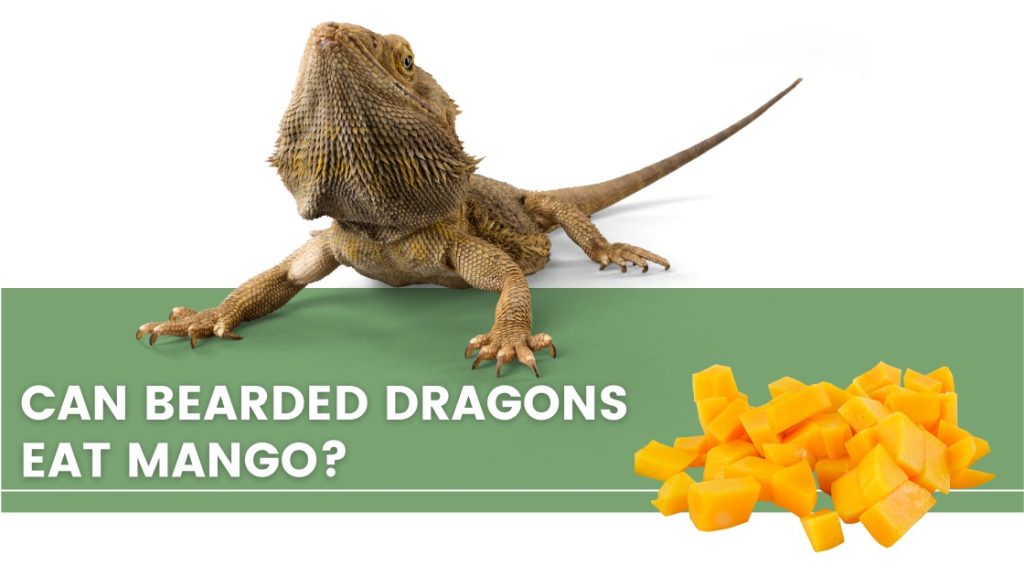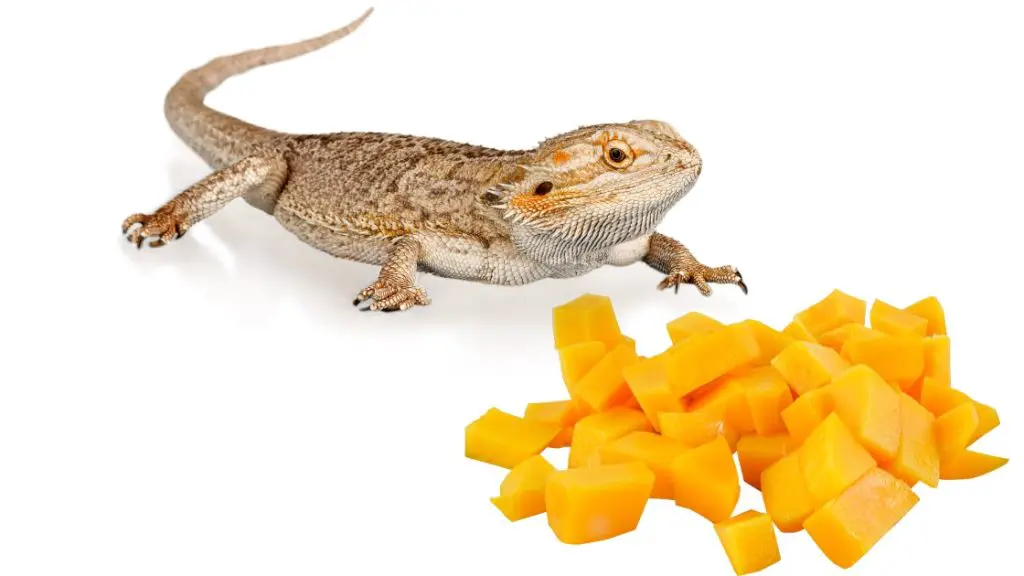
Can Beardies Safely Gobble Up Mango?
If you’ve ever had a sweet, juicy mango you might just get the urge to feed this tropical fruit to your bearded dragon.
But can bearded dragons eat mango?
Yes, a bearded dragon eat mango, but it should only be fed in moderation. It also needs to be prepared in the correct way to be a safe food.
So in this article, we’ll tell you all about it, the risks, the nutritional value, and everything you need to know in order to give your beardie a tropical treat.
Some Of The Perks When Feeding Mango To Your Pet Dragon
Mango is rich in vitamins and minerals and is therefore safe to be given to your bearded dragon a few times a week. Let’s take a look at some of the benefits.
- Vitamin C and A: This is key to a healthy immune system, vision, reproduction, and growth.
- Vitamin E: Repairs damaged cells and prevent inflammation
- Vitamin K: It is essential for tissue and blood cell maintenance
- Fiber: Promotes regular digestion
- Folate: Assists in tissue growth and cell maintenance
- Antioxidants: Strengthen the immune system and also your bearded dragon’s digestive system
- Manganese: Helps regulate metabolism and blood clotting
- Magnesium: Maintains healthy muscles and brain
- Zinc: Helps maintain recovery after injury
- Potassium: Mango is high in potassium which helps regulate blood pressure and the nervous system and also helps keep your dragon’s muscles working and retain proper water retention.
- Oxalates: Another great aspect of mango is that they are low in oxalates Too many oxalates can be extremely harmful and even fatal to bearded dragons. It prevents calcium absorption and can lead to metabolic bone disease.
- Balanced calcium to phosphorus ratio: Mango has just the same amounts of calcium and phosphorus.
Risks When Your Beardie Eat Mango Daily?

As mentioned earlier, it can be beneficial to feed mango to your beardie, but this does not mean you should give it mango every day. Here are some of the reasons why:
Lots of sugar
Your bearded dragon should eat mango daily because it is very sugary. Too much sugar can cause health issues such as tooth decay, liver disease, and even heart failure. Excess sugar can also cause obesity which is one of the biggest health risks for bearded dragons in captivity.
Low in Calcium
Mango is not a great source of calcium. Calcium is extremely important and it should not be lacking from your bearded dragon’s diet.
High in Vitamin A
Mango is very high in vitamin A and when taken together with vitamin supplements your beardie can be put at risk of developing vitamin A toxicity. Symptoms of vitamin A toxicity also called hypervitaminosis A overdose, include swelling, weakness, dehydration, and weight loss.
When fed on an occasional basis, bearded dragons can have several benefits from having mango. This fruit contains substances that can help combat free radicals in your beardie body. Free radicals can sabotage the overall health of your bearded dragon. Feeding your pet dragon antioxidants will keep your beardie healthy.
For these reasons, it is important to always feed your bearded pet dragon a balanced diet.
Preparing Mango For Your Bearded Friend?

It is not recommended by veterinarians to feed the mango peel to bearded dragons, as it can cause an obstruction.
Mango peels have essential antioxidant compounds such as carotenoids, and polyphenol as well as some dietary fiber and vitamins.
These antioxidant compounds are responsible for destroying free radicals in your bearded dragon’s diet. It is however not recommended that bearded dragons eat mango peels because they can be relatively hard with a rough texture.
Never feed your bearded dragon mango leaves since it is very rough and can cause tongue irritation and injure their mouth lining.
When selecting mango or other fruits for your beardie, make sure to always try and buy organic fruits. Organic mango is free from harmful pesticides. Make sure to always feed ripe mango to your bearded dragon. It is yummy and has a lot more antioxidants.
Wash the mango thoroughly and remove the peel. Although the mango peel is nutritious it is often too rough for bearded dragons. Rather play it safe and remove the peel before offering the mango to your beardie.
Slice the mango into very small pieces to prevent choking. Mango pieces can be served on their own or in a salad. The mango pieces can be added to other healthy fruits such as strawberries. Your bearded dragon will love the sweet taste of mango.
Final Thoughts
In answer to the question: “Can bearded dragons eat mangos”, the answer is, Yes! However, it should not form part of their staple food because it is very high in sugar. Too much sugar is not good for your beardie.
So, remember the next time you eat mango that your little dragon friend might be watching you with a longing for a small taste of the sweet, juicy fruit.
Continue to read our main article “What do Bearded Dragons Eat?” for all the ins and outs on general diet questions, and get a further detailed breakdown of other popular foods in the articles below:
- Can Bearded Dragons eat tomatoes?
- Can Bearded Dragons eat oranges?
- Can Bearded Dragons eat parsley?
- Can Bearded Dragons eat blackberries?
- Can Bearded Dragons eat pumpkin?
- Can Bearded Dragons eat pineapple?
- Can Bearded Dragons eat cantaloupe?
- Can Bearded Dragons eat green beans?
- Can Bearded Dragons eat cherries?
- Can Bearded Dragons eat asparagus?
- Can Bearded Dragons eat cauliflower?
- Can Bearded Dragons eat avocado?
- Can Bearded Dragons eat brussel-sprouts?
- Can Bearded Dragons eat collard-greens?
- Can Bearded Dragons eat wax-worms?
- Can Bearded Dragons eat dandelions?
- Can Bearded Dragons eat nightcrawlers?
- Can Bearded Dragons eat earthworms?
- Can Bearded Dragons eat eggs?
- Can Bearded Dragons eat cicadas?
- Can Bearded Dragons eat basil?
- Can Bearded Dragons eat peaches?
- Can Bearded Dragons eat grasshoppers?
- Can Bearded Dragons eat sweet potato?
- Can Bearded Dragons eat hornworms?

